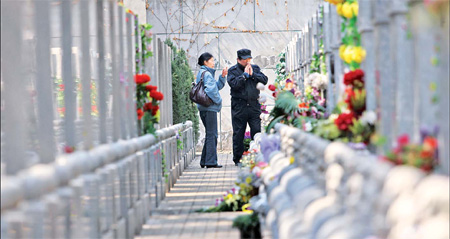Society
Fallen foreign heroes not forgotten
(China Daily)
Updated: 2010-04-02 07:05
 |
Large Medium Small |
After many decades, foreigners who died for China still live in the memories of Chinese
|
|
As Chinese prepare to pay their respects to departed loved ones during Qingming Festival - Tomb-sweeping Day - on Monday, it is traditionally a time to remember the heroes who helped shape modern China.
But it is not just Chinese martyrs who are in people's thoughts; it is also the likes of Dwarkanath Kotnis and the brave Flying Tigers, who have remained not only firm fixtures in school textbooks, but also in the hearts and minds of Chinese.
Like the words on a tombstone, the actions of the past are engraved in history, and for Chinese, Qingming Festival, which is celebrated on the 15th day after the spring equinox, is one of the most important days.
People have offered sacrifices to their ancestors for more than 2,500 years since the Eastern Zhou Dynasty (770-256 BC). Nowadays, people clean their ancestors' tombs and eat cold food. Weeds are pulled and dirt swept away, and the family makes offerings and burns special "money".
Although largely a festival for families, many still take time to remember the actions of a few. However, experts have discovered that some heroes' tombs have fallen into disrepair due to a lack of care.
Today, students still learn about legendary author and former Peking University scholar Edgar Snow, and budding medics still celebrate the dedication of George Hatem. But the tombs of others, such as the Flying Tigers, who bolstered China's war effort, have either been forgotten or lost due to the nation's rapid development.
To mark Tomb-sweeping Day, China Daily reporters went to four cemeteries across China to not only visit the tombs of some of China's most important and influential foreign heroes, but also talk to the people who honor and preserve their memory.
Busy time for martyrs' memorial
These are busy times for the staff at the North China Martyrs' Memorial Park in Shijiazhuang, Hebei province. At least two memorial ceremonies will be held every day until April 6 as thousands flock to pay their respects to the dead ahead of Tomb-sweeping Day.
Among the national heroes interred in the park are Norman Bethune (1890-1939), a Canadian surgeon, and Dwarkanath Kotnis (1910-1942), an Indian doctor, both of whom provided vital medical assistance to China during the War of Resistance against Japanese Aggression (1937-1945).
"We had more than 5,000 people come for the morning ceremony on the first day," said Duan Fengguo, a park worker who is responsible for compiling the guest list. "People come in here to make appointments with us to join these ceremonies and, just a few days ago, some Canadian visitors came in with a wreath for Bethune."
College students and high school pupils also come to the park to learn more about their revolutionary heroes.
"Our students walked for one hour from our campus to get here," said Hou Zhiqi, an official with Hubei Banking School, who was accompanied by more than 800 youngsters wearing handmade paper flowers. "We want to encourage them to follow the examples of the revolutionary generation, who were hard-working and plain-living."
Wandering along the many paths of the memorial park are also people who come on their own to reflect, far from the noisy crowds.
"I think history is actually neglected during these ceremonies, so I'd prefer to spend more time in the museum looking at old pictures and learning a few details about the heroes' lives," said 27-year-old Liu Hui, a medical intern at the No 3 Hospital of Hebei Medical University. "I was so surprised to see the picture of Bethune as he operated without wearing gloves."
Although people come to pay homage in different ways, the majority share one thing in common: They have all read In Memory of Norman Bethune, an article written by Mao Zedong following the medic's death in 1939.
"I think Bethune is the most famous foreign friend to China and, although Kotnis is not as famous, they both made great contributions," said He Liming, 30, who works in a nearby supermarket and quoted Mao's article by adding: "They 'made light of traveling thousands of miles to help us'."
Every year, she comes to visit the tombs for Tomb-sweeping Day. "They were great people. Hopefully, they can bring me some good luck as well," she added.
